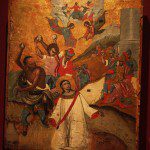The absolute truth will never be what we think it is. Whatever we come to know of the truth can be said to be true insofar as it is derivative of the absolute truth, but yet, no matter how much we know, we will never be able to comprehend the truth in itself.
The mind establishes understanding of what it experiences, and so constructs a vision of the truth through that understanding. Yet, we must remember, the absolute truth is not something which is constructed or established by the human mind, but rather is a part of that reality in which the mind resides. The human mind is limited in what it can comprehend, and so we should be humble in our expression of the truth. What we can know is true, but of a relative nature.
Certainly, the absolute truth forms the basis by which we know any relative representation of the truth as being true, but the absolute truth infinitely transcends us, and so infinitely transcends any relative presentation of the truth despite it properly being said to be the truth. That is, every representation of the truth outside of the absolute truth is relative to that absolute, and when compared to the absolute truth, it is to be recognized as empty of the truth. This is because the absolute truth is infinitely greater than any relative truth.
This is not to say what we believe and discern of the truth, and the conventions which we use to portray the truth and contemplate it further, are false and so to be declared as untruth. They would be if we held on to them and were attached to them as absolute truths, but if we see them all as relative truths which participate in the absolute truth, so long as we let them participate in the absolute and allow the absolute truth to flow into them and give them their relative value, they can be accorded the name of truth and given respect for being a relative representation of that truth.
When confronted with the absolute truth, we must not try to comprehend it. If we try to grasp hold of it and assume what we take in is the absolute truth, we will end up mistaken, for we will receive at best some little portion of the truth which will be misconstrued for the whole of the truth, limiting, therefore, the truth itself. That is what we declare to be the absolute truth will not be the absolute truth, and so we will be in grave error, because we will have infinitely reduced the truth to that which we can grasp by our mind. On the other hand, we must not close ourselves off from the truth either, because then we will once again find ourselves turned against it and not receiving it. Instead, we must free ourselves to experience it without attachment, to let it penetrate us as we experience it all things in it, allowing ourselves to be united to it without absorption.
Now, it is one thing to understand we are limited beings, with a limited ability to comprehend the truth, but it is another to really know and realize it and all its implications in our lives, so as to be set free to truly be open to the experience of the absolute truth without attachment. When we speak of the truth in this fashion, we are still speaking of it in words, and so express the truth in a conventional form, albeit a sophisticated convention because it points to the truth beyond itself. Our purpose should not be to end up with this convention and think we have realized all we can realize in our experience of the truth, but to follow it to where it points, to the absolute truth which is God. This is the goal of the Christian life, to come to God and be united with him as partakers of the divine nature. We will be lifted up beyond ourselves and our limits and become by grace what God is by nature, so that we are given a share of the divine life to experience. For God is the absolute truth, and to unite with the absolute truth is to unite with God.
In our open unity with God, we will be able to see and know all things through God, through the absolute truth, in a form and manner which transcends our natural ability and inclination and yet will allow us to also form a relative and so proper truth which comes out of that experience. It will be truth, and all that we discern will be truth, though of course, the absolute as absolute will always transcend us, so that, even when we come to see and know more through union with God, we will be made greater and opened up further so as to experience even more and greater portions of the truth. Our union with God will be a never-ending journey where our experience and comprehension of the truth will grow as grace makes us greater and allow us even more realization of the truth. We will go from truth to truth, from the greatness we have found ourselves in to something even greater, allowing for never-ending joy.
This experience is not just for us in eternity. We should begin it in our present life, and in doing so, realize that what we gain from it should not be selfishly horded by us but should be shared with others, helping all come experience the grandeur of the truth.
Moses represented one who has attained such union with God. He was able to see the “backside” of God, and not the face, because he was not able to see and perceive the absolute truth in its fullness, but only able to come up with and experience the truth coming from behind the truth itself. He was led by it, instead of being its equal. Moreover, he was called by the truth to be opened up and experience the truth so that he would not stay put in but not to stay in one particular experience, one exposition of it, but to continue moving forward, coming to greater and greater understanding of the truth as he approached the promised land of God’s glory.
![St. Gregory of Nyssa [Public domain], via Wikimedia Commons](https://wp-media.patheos.com/blogs/sites/637/2016/12/St._Gregory_of_Nyssa-221x300.jpg)
It seems to me that at the time the great Moses was instructed in the theophany he came to know that none of those things apprehended by sense perception and contemplated by the understanding really subsists, but that the transcendent essence and cause of the universe, on which everything depends, alone subsists. [1]
Likewise, we can now follow after Moses, experience what he experienced, and so guide and direct others to salvation, if we follow his example:
In the same way that Moses on that occasion attained to this knowledge, so now does everyone who, like him, divests himself of the earthly covering and looks to the light shining from the bramble bush, that is, the Radiance which shines upon us through this thorny flesh which is (as the Gospel says) the true light and the truth itself. A person like this becomes able to help others to salvation, to destroy the tyranny which holds power wickedly, and to deliver to freedom everyone held in evil servitude. [2]
The one who has attained the truth will attain the truth which is love. This is because God is the truth and God is love (cf. 1 John 4:8). Love gives to all, seeking nothing for itself:
Love is patient and kind; love is not jealous or boastful; it is not arrogant or rude. Love does not insist on its own way; it is not irritable or resentful; it does not rejoice at wrong, but rejoices in the right. Love bears all things, believes all things, hopes all things, endures all things (1 Cor. 13:4-7 RSV).
Those who know the truth and let it penetrate them, that is, those who know God and let his love come over them, will follow the example of the truth which is love. They will act with self-sacrificial love, never concerned with their own grasping of the truth apart from how they can share what they have gained with others. True experience of the truth will follow the truth and act in reflection of the truth, the truth which is love. This is how and why we can and will be able to discern who has come to know the truth, for they will reveal it by their love.
[1] St. Gregory of Nyssa, The Life of Moses. trans. Evert Ferguson and Abraham J. Malherbe (New York: Paulist Press,1978), 60
[2] Ibid., 60-1.
Stay in touch! Like A Little Bit of Nothing on Facebook:
A Little Bit of Nothing











